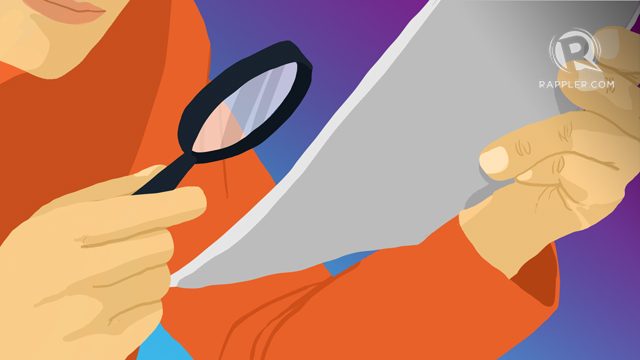SUMMARY
This is AI generated summarization, which may have errors. For context, always refer to the full article.

MANILA, Philippines – Does the media really need to fact-check what government says?
The short answer is yes. During a meeting livestreamed for the first time on Facebook Thursday, August 11, Newbreak, Rappler’s investigative arm, discussed the importance of fact-checking the list of names President Rodrigo Duterte read on August 7.
The list included 158 individuals from the judiciary, local government, military, and the police who are allegedly involved in the illegal drug trade – either as protectors, users, or drug lords. (READ: The Duterte list: Judges, mayors, police officials linked to drugs)
Upon checking, however, we spotted insufficiently verified information on the part of the Palace regarding the alleged drug personalities.
“Coming from the President, there are certain expectations na dapat buo ang pangalan (the name should be complete), accurate information,” Glenda Gloria, Rappler managing editor, said. “The dilemma of the journalist here is that it’s coming from your President – who has the mandate of the people – identifying people.”
Why fact-check?
The publication of fact-checking reports drew criticism from netizens accusing reporters of nitpicking and hindering the anti-illegal drugs effort of the Duterte administration.
For example, one of the 7 judges included was found to be dead since 2008. Among local government officials, we found that an ex-mayor named had been dead since 2014, while a named congressman never even became a legislator in the past.
We also found that out of the names of local government officials included in the official transcript sent by Malacañang to the media, 14 were misspelled and 27 persons had inaccurate or incomplete designations and locations.
Rappler editor-at-large Marites Vitug, pointed out that aiming for accuracy is not meant to undermine any efforts of the government but is at the core of journalism.
“Getting at the truth is never undermining any operation, whether anti-crime or anti-drugs,” she explained. “The core of our profession is the truth. Even in any government campaign, if we tell the truth in any certain campaign, it makes our officials accountable.”
An inaccurate name on the list would put people with an identical name in danger.
“Kasi may danger na may mga magkapangalan (There’s danger for those who share names),” Vitug said. “Kapag nilabas mo na ang (Because if you publicize the) name and they’re allegedly involved in drugs – we all know these vigilante killings – what if people take the law into their own hands and go after these people?”
Media organizations were not the only ones to point out incomplete or inaccurate information on the Duterte list.
The Armed Forces of the Philippines (AFP) and various offices of the Philippine National Police (PNP) came forward to report that some of their men who were identified by Duterte were either already dead or discharged years ago.
It is also not the first time fact-checking has been done, Rappler investigative head Chay Hofileña emphasized. In the past, especially during the elections, in the past administration, and even past State of the Nation Addresses (SONAs) media organizations fact-checked claims made by various government officials.
“This is not the first time we’re fact-checking,” she said. “Part ng DNA ng media na mag-fact check (It’s part of the DNA of media to fact-check) and it’s not really intended to undermine anyone.”
Crowdsourcing
Rappler enlisted the help of readers by crowdsourcing information on the 158 names included in the list alleged to be part of the illegal drug trade in the Philippines.
However, some netizens quickly criticized this decision, stating that it is “lazy journalism.”
Rappler reporter Katerina Francisco, however, explained that crowdsourcing is just an “initial step” for journalists.
“We use [crowdsourcing] to get leads, kung sino ba dito ang puwede natin unahan i-investigate (who here we can first investigate),” she said. “Just because we crowd-source, it doesn’t mean we use it [information] on its own without vetting and verifying.”
Upon receiving crowdsourced information, journalists then use various means to verify these claims. Verifying includes comparing the information with other important documents and checking with other sources, among others.
“Nag-iiba na ang panahon. It’s an era of collaboration,” Hofileña explained. “Kasi 158 ang nasa listahan at hindi natin mave-verify lahat iyon, lalo na kung nasa Davao, Mindanao, o Visayas kasi wala namang quick access to that. So iyong mga tagaroon, puwedeng magbigay ng information.”
(Times are changing and it’s an era of collaboration. There are 158 on the list and we can’t verify all of them, especially if they are in Davao, Mindanao or the Visayas since we don’t have quick access to those areas. So people who live there and know them, they can give information.)
Vitug, meanwhile, stressed that crowdsourcing also helps empower citizens at a time when a lot of importance is given to citizen journalism.
“This crowdsourcing – don’t readers want to be empowered to help the media?” she asked. “But rest assured, the information was double-checked.” – Rappler.com
Add a comment
How does this make you feel?
There are no comments yet. Add your comment to start the conversation.